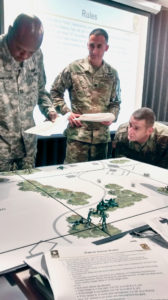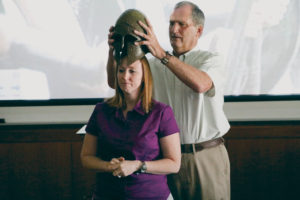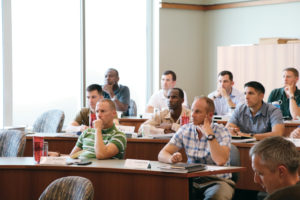Living away from home for the first time, meeting people from different backgrounds, being exposed to new ideas — in many ways, the college freshman and the military recruit are navigating the same challenges as they embark on adulthood. And yet in a few short years, their experiences of the world and the way they perceive it can become oceans apart.
For the military veteran who has deployed in the dead of night, parachuted into unfriendly territories and scoured foreign roads for IEDs, returning to the world of libraries, term papers and tailgating can have the sense of being in a strange land once more.
Recognizing the unique needs of returning military members, UofL established the Office of Military and Veteran Student Services in 2009 to help ease the transition from military to student life. This includes helping UofL’s veteran and military students navigate the admissions process and apply for G.I. Bill benefits, as well as assisting them with withdrawals and re-admittance when they’re deployed or called to
active duty. There are 971 veteran and active-duty military students enrolled at UofL this semester.
The office’s existence and other university efforts have helped UofL earn the
distinction of being named a military-friendly university for the seventh year in a row by publishing company Victory Media Inc. The company also praised UofL for
its military-focused degree offerings, exercise therapy classes for wounded soldiers and VetStart, a program developed by the College of Business that helps veterans
start their own businesses.
The Office of Military and Veteran Student Services staff — Kristen Roy, program coordinator senior and Carissa Gentry, VA certifying official and program coordinator — helps connect students with resources available to them on campus or through the Veterans Affairs office, such as tutoring, counseling and health care. For disabled veterans, including those suffering from post-traumatic stress disorder or other mental health issues, UofL also provides vocational rehabilitation benefits, which give veterans additional counseling and support throughout their educational careers.
For Gentry, a U.S. Navy veteran, the work is personal. “When I came out of the military, nobody told me about vocational rehabilitation. I want to be that direct connection so students know they have that option. I don’t want them to find out 10 or 12 years too late, like I did.”
From the barracks to the blackboards
Meanwhile, thousands of other young men and women across the United States are being introduced to military and university life at the same time through the Reserve Officers’ Training Corps (ROTC), a college-based officer training program in place on 275 campuses and more than 1,100 other affiliated institutions of higher education. ROTC students attend regular college classes as well as military training programs taught on or near campus. As it happens, all cadets nationwide in the Army ROTC receive instruction from cadre
and faculty who have trained at Fort Knox — an Army base just 40 miles south of UofL and home of the U.S. Army Cadet Command.
A couple years ago, the commanding general of Cadet Command reached out to UofL’s College of Education and Human Development in search of a rigorous program that would help ROTC faculty become more effective educators and better engage today’s college students.

CEHD professor and chair Jeffrey Sun, who spearheaded the project, explained that the Army knows “in order to win wars and battles, they’re going to have to rely much more on the cognitive dominance — the brain power — more so in the future than just physical fighting.”
“In order for us to do that,” Sun continued, “we have to upscale what the cadre and faculty can do, because they’re teaching the future officers, the cadets. So we’ve created a program that looks at multiple areas, including innovative problem solving, critical thinking skills, ethical decision making, technological infusion, strong pedagogical learning styles and leadership.”
In 2015, the CEHD kicked off a pilot version of the Cadre and Faculty Development Course with 82 Army educators learning from 60 nationally recognized faculty and staff — including 22 from UofL — over the course of 10 weeks of 40 to 45 classroom hours each. Thanks to the overwhelmingly positive response, the U.S. Department of the Army awarded UofL’s CEHD an $848,000 grant to expand the program to accommodate 366 educators in 2016 and 300 in 2017.
At present, UofL is the only university the Army has asked to host this program, and while that alone is a high honor, Sun sees an even broader impact: “While we’re teaching faculty members or cadre in potentially a thousand different campuses, the effect that we’re going to have on our military is huge. Because they’re training thousands more cadets who are going to be future officers of our Army.”
In addition to the intense summer session at UofL’s Fort Knox campus, cadre and faculty return to their respective campuses in the fall to put the principles they’ve learned in action, meeting with their faculty mentor over videoconferencing services like Skype.
“The reason we want to give them one-on-one touchpoints is because each of their campuses is so different,” Sun explained. A small, religious-affiliated college in the Midwest will have a different student body and learning culture than, say, a large public university in the Northeast. “We gave them general principles of what to teach, but we want them to cater the program to the campus and to the types of students that they have.”
Enjoying the fellowship of thinkers
As it turns out, even those “future officers” that Sun references choose to compete and are selected to study at UofL. Col. Archie S. Herndon Jr., will be the third Army War College Fellow UofL has hosted in as many years. That makes the university one of only 48 educational across the United States and overseas to host this prestigious program, which allows senior officers in the Army to spend a year in a civilian setting conducting research and broadening their outlook to sharpen their skills as strategic thinkers.
During his or her year at UofL, the Army War College Fellow participates in McConnell Center lectures and seminars, audits graduate classes and produces a research project closely related to his or her career. Fellows are assigned faculty mentors from UofL and the Army War College, as well as a senior military officer adviser.
Gary Gregg, PhD, director of the McConnell Center, which serves as the Fellows’ “home” on campus, explained, “When a War College Fellow comes here, they try to make themselves available and actively engage with the community.” That often means speaking to veterans’ and student groups, including the McConnell Scholars, as well as meeting with other community leaders.
Last year’s Fellow, Lt. Col. Thomas Russell-Tutty, was a military police officer who had recently served as deputy commander of the 6th Military Police Group Criminal Investigative Division (CID), which is responsible for an area that covers half of the globe. During his time at UofL, he built a relationship with Louisville’s Chief of Police and witnessed the planning process for security at Thunder Over Louisville and the Kentucky Derby, giving him a civilian’s perspective on security at large events.
“My year as the University of Louisville’s U.S. Army War College Fellow was both a phenomenally rewarding and enriching experience,” he said. “It allowed me to increase my knowledge about how our government actually operates, as well as strengthening my resolve and reinforcing my dedication for what I do as a soldier.”
The benefits of the U.S. Army War College Fellow program flow in both directions. “I think all of our students have found it extremely broadening for them to have access to an accomplished military officer,” Gregg said. “When the Fellows have been part of our seminar discussions, they’ve always added valuable insights that the average civilian professor just can’t offer. It’s great to have that kind of diversity here on campus.”
Broadening the minds of world travelers
Yet for other members of the military — especially mid-career leaders — life can start to seem like a never-ending cycle of training and deployment. To help prevent such ruts, the Army instituted a number of Strategic Broadening Seminars — intense, focused courses that give soldiers the opportunity to expand their horizons in a civilian setting and strengthen their strategic thinking and leadership skills.

One of only a handful of universities in the country chosen to do so, UofL has hosted the program annually since 2014. Designed to capitalize on UofL’s unique strengths, the curriculum focuses on three key themes — leadership, Constitutional government and the international security environment — and draws on faculty expertise from the McConnell Center and the Center for Asian Democracy, as well as Political Science, History, Liberal Studies and Asian Studies departments.
During the intense 30-day course, the 30 soldiers in the program study political thinkers such as Thucydides, Plato, Machiavelli, Sun Tzu and Alexis de Tocqueville, as well as the Federalist Papers and the U.S. Constitution to aid in discussions of the challenges of democracy and the essential qualities of political and military leadership.
“We take classical political philosophy and we try to make it relevant to them and let them wrestle with these big concepts of what it takes for a democracy to work and the responsibilities of leadership,” said Gregg, who designed the program.
That the soldiers engage with the Constitution in a deep and meaningful way was critical to Gregg. “All soldiers take an oath to protect and defend the Constitution,” he explained. “And so I thought it was important for them to seriously read and think about the American Constitution. We talk about separation of powers, war powers, the history of the Constitution, the evolution of it in practice. It’s been a really terrific part of the program.”
Soldiers also take an in-depth look at the political dynamics, economic issues and cultural environment of Asian countries, most notably China. The soldiers then divide into groups and delve into a topic from the Army War College’s annual Key Strategic Issues List (KSIL), aided by a faculty mentor. Teams research their topic, devise solutions, write a paper and then present their findings in a briefing to an Army general.
More than 20 distinguished military and academic leaders, including UofL faculty, engage with the soldiers through a mixture of seminars, lectures and negotiation simulations. Past speakers include Lt. Gen. Josiah Bunting, President of the Guggenheim Foundation and Vietnam veteran; William B. Allen, former chairman of the U.S. Commission on Civil Rights; and Maj. Gen. Thomas C. Seamands, commanding general of the Human Resources Command at Fort Knox, where he leads an organization that manages the careers of more than one million soldiers around the world.

“The Strategic Broadening Seminar is an excellent opportunity for our soldiers and officers to step back from their daily duties and build some academic and intellectual capital,” said Seamands. “It enhances skills that are essential to do more with less and in more innovative ways. Those who attend are different when they graduate and come back to the Army.”
Cpt. Matthew Scrivner, who took the course in 2015, agreed. “I can honestly say that this has been the best, most intellectually challenging and stimulating month of my life. The accommodations, program subject and depth, faculty expertise and level of concern and regard provided by the McConnell Center were second to none.”
At the end of the 30 days, the soldiers return to their stations around the world, but not without the sense of having explored new intellectual ground and gained a deeper understanding of justice, freedom and democracy — the very ideas they risk their lives to defend every day.
Read more about UofL’s partnerships with the military here.




























